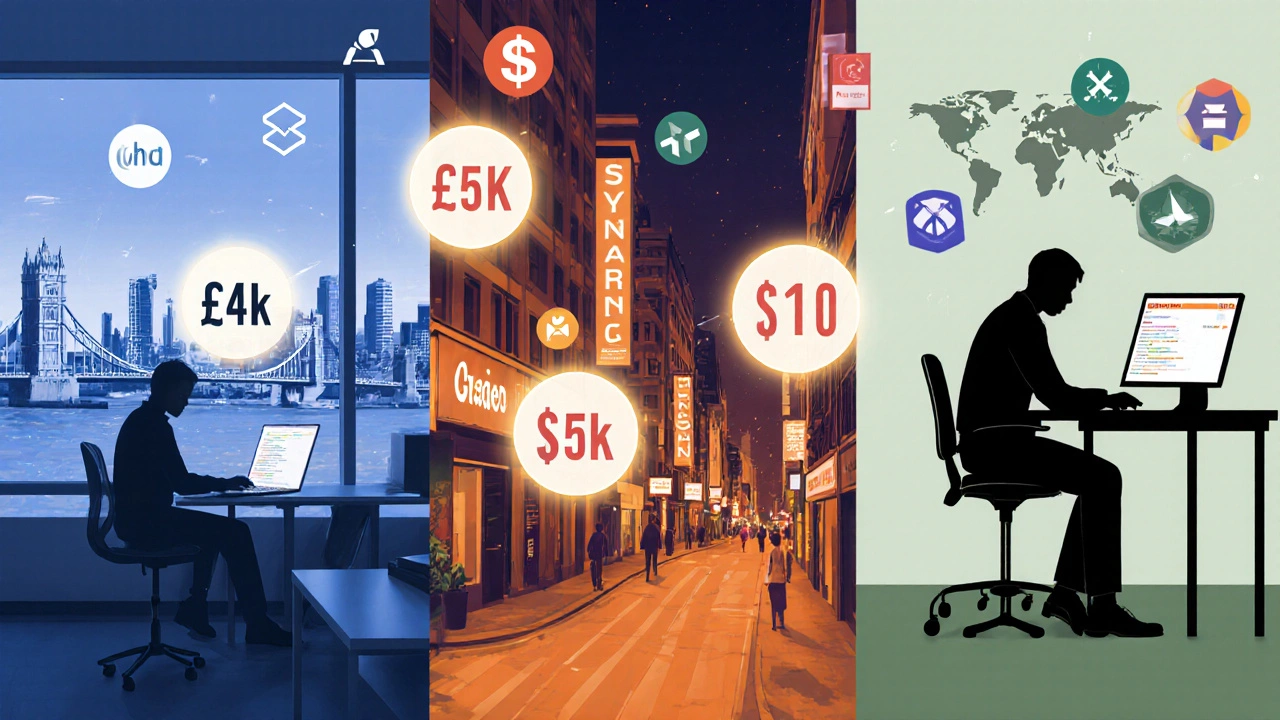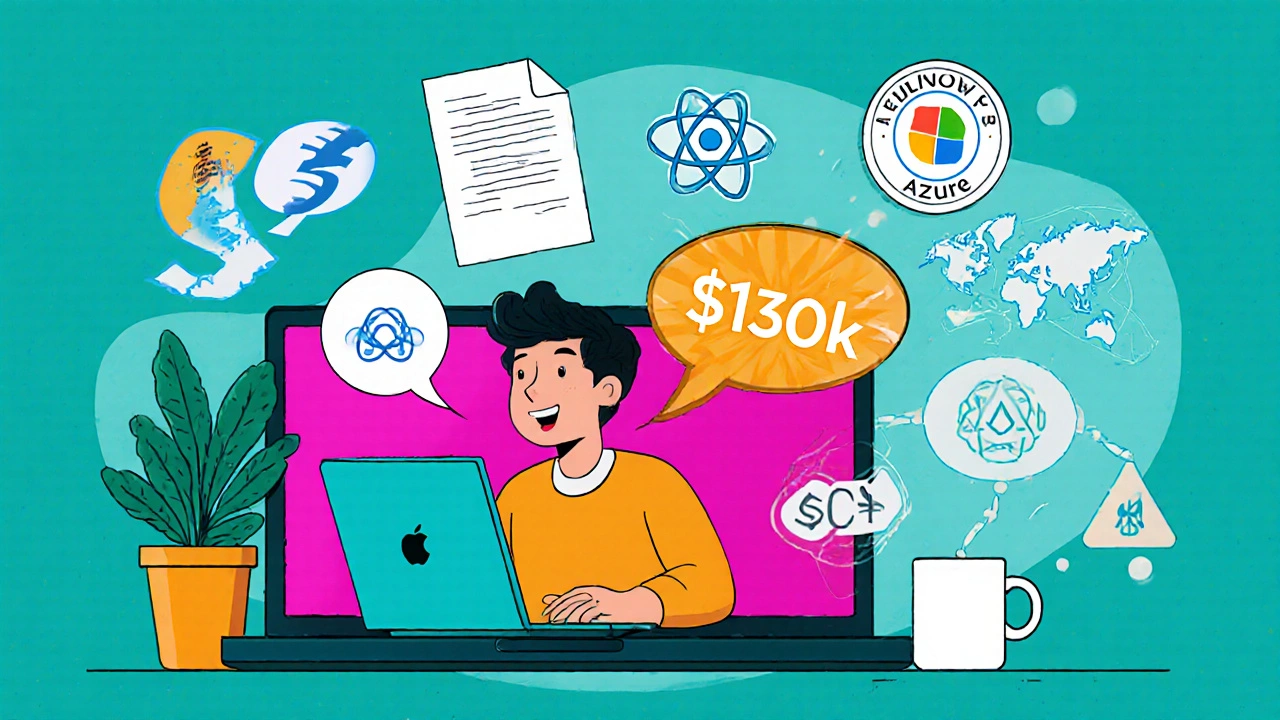Salary Estimator for Web Developers
Estimate Your Web Developer Salary
Based on 2025 industry data for developers without a degree
Estimated Salary
Ever wondered how much a Web Developer is a professional who builds and maintains websites and web applications can earn without a formal degree? The short answer: plenty, but the exact figure depends on where you work, what you know, and how you position yourself. Below we break down the real numbers, the biggest pay drivers, and practical steps to boost your earnings without stepping into a lecture hall.
Quick Summary
- Entry‑level roles in the UK typically start around £28k‑£35kannual, rising to £45k‑£55k in high‑demand cities.
- In the US, junior developers earn $55k‑$75k; senior roles can exceed $130k.
- Freelancers often bill $50‑$150per hour, translating to $80k‑$180ka year if steady work lands.
- Key pay boosters: mastering in‑demand frameworks, remote work, certifications, and a solid portfolio.
- Negotiation tips: know market rates, quantify impact, and leverage contract offers.
Why a Degree Isn’t the Only Ticket
Employers value output over paperwork. Companies like GitHub, Automattic, and many startups hire no‑degree developers candidates who prove their skills through projects, open‑source contributions, or certifications. A 2024 Stack Overflow survey showed 62% of high‑earning developers (earning >$120k) never earned a computer‑science degree. The tech world rewards demonstrable ability, especially when you can ship code that solves real problems.
Core Factors That Determine Earnings
Several variables shape the compensation curve:
- Experience Level - From intern to senior lead, years on the job matter.
- Technical Stack - Mastery of hot technologies (React, Node.js, TypeScript, GraphQL) commands higher rates.
- Geography - Salaries differ between London, Manchester, remote US, and emerging markets.
- Employment Type - Full‑time, contract, or freelance each have distinct pay structures.
- Industry - FinTech, e‑commerce, and health tech often pay a premium.

Salary Ranges by Experience (2025 Data)
| Experience Level | UK (£ per year) | US (USD per year) | Freelance Rate (USD per hour) |
|---|---|---|---|
| Junior (0‑2years) | 28,000‑35,000 | 55,000‑75,000 | 50‑80 |
| Mid‑level (3‑5years) | 45,000‑55,000 | 85,000‑110,000 | 80‑110 |
| Senior (6‑9years) | 60,000‑80,000 | 115,000‑150,000 | 110‑150 |
| Lead/Architect (10+years) | 90,000‑120,000 | 150,000‑200,000+ | 150‑200 |
These numbers reflect roles where the candidate’s résumé highlights strong portfolios, GitHub activity, or relevant certifications rather than a university transcript.
Geographic Pay Differentials
Location still matters, even for remote work. In the UK, London salaries sit 20‑30% above the national average, while Manchester and Bristol lag slightly behind. Across the Atlantic, SanFrancisco and NewYork pay the most, but cost‑of‑living adjustments narrow the real‑income gap. Remote‑first companies often level pay based on employee experience, not zip code, which opens doors for talented developers outside major hubs.
Freelance vs. Full‑Time: Which Pays More?
Freelancing offers flexibility and higher hourly rates, but income can be irregular. To illustrate, a mid‑level Freelance Web Developer a self‑employed professional who contracts on a per‑project basis charging $100hour may earn $180kyearly if they secure ~1,800 billable hours-roughly 45 weeks of full‑time work. However, downtime, taxes, and benefits need to be factored in.
Full‑time roles provide stability, health coverage, and paid leave. Many developers start freelancing on the side to test waters, then transition once they have a steady client pipeline.

Upskilling & Certifications That Boost Pay
While a degree isn’t required, certain credentials signal expertise to hiring managers:
- Google UX Design Professional Certificate - Helps blend design and development, valued in product teams.
- Microsoft Certified: Azure Developer Associate - Adds cloud competence, often worth $5k‑$10k in salary.
- React.js and TypeScript mastery - Companies pay a premium for front‑end engineers fluent in these libraries.
- Node.js Certified Developer - Opens back‑end opportunities with higher hourly rates.
Investing in a couple of focused courses (average $300‑$800 each) can move you from the junior to mid‑level bracket within a year, according to data from Indeed’s 2025 salary tracker.
Negotiating Your web developer salary Without a Degree
When the offer arrives, treat it like a data point, not a final verdict. Here’s a quick playbook:
- Research - Use Glassdoor, Levels.fyi, and local job boards to benchmark the role.
- Quantify impact - Highlight projects where you cut load time by 30% or increased conversion rates by 12%.
- Leverage multiple offers - Even a single extra interview can give you bargaining power.
- Ask for non‑salary perks - Remote stipend, professional development budget, or equity can bridge gaps.
- Practice salary scripts - Rehearse stating your desired range confidently.
Remember, many hiring managers assume candidates with degrees command higher pay. By presenting concrete results, you can neutralize that bias.
Common Pitfalls and How to Avoid Them
Even without a degree, certain mistakes can stall earnings growth:
- Over‑specializing - Focusing solely on one framework makes you replaceable. Keep a full‑stack perspective.
- Neglecting soft skills - Communication, teamwork, and client handling affect salary negotiations, especially in senior roles.
- Skipping portfolio upkeep - An outdated GitHub or personal site signals stagnation.
- Ignoring tax obligations - Freelancers must budget for self‑employment tax, which can erode net earnings if unplanned.
Address these early: update your portfolio monthly, contribute to open source, and take at least one leadership‑oriented project each year.
Frequently Asked Questions
Can I really earn six figures without a computer‑science degree?
Yes. Senior and lead web developers in high‑cost markets (London, San Francisco) regularly exceed $120kUSD or £100kGBP, even if their highest credential is a bootcamp certificate. The key is demonstrable expertise, a strong portfolio, and often, experience with in‑demand frameworks.
Do certifications really increase my pay?
Data from the 2025 Global Skills Report shows certified developers earn on average 12‑15% more than peers with comparable experience but no formal credential. Certifications act as a signal that you’ve mastered a specific technology, which can justify higher rates.
Is freelancing riskier than a salaried job?
Freelancing brings income volatility and tax responsibilities, but it also offers higher hourly earnings and flexibility. Many developers mitigate risk by keeping an emergency fund covering three months of expenses and using platforms like Upwork or Toptal to secure a steady stream of contracts.
How important is a portfolio compared to a résumé?
For non‑degree candidates, the portfolio is often the primary hiring tool. A live site or GitHub repo that showcases performance improvements, responsive design, and clean code can outweigh years of generic experience listed on a CV.
What are the best remote‑first companies for web developers?
Companies like Automattic, GitLab, and Zapier consistently rank high for remote developer compensation and benefits. They often set salary bands based on skill level rather than location, making them attractive for developers without a degree.


